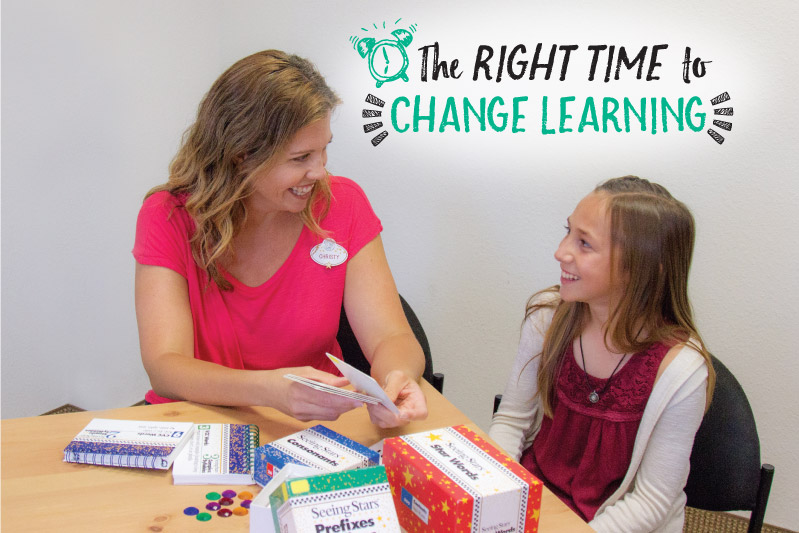Get Help During the School Year: The Right Time to Change Learning

School at any year can include the kind of good challenges that foster learning: discovering a solution in science lab, writing a poem, or even studying for a big test, can all be positive learning experiences. However, if a student has a weakness that affects learning to begin with, they may not be getting everything they should from school. Their challenges with reading or comprehension may be hindering their ability to fully participate in schoolwork. And, rather than catch up eventually, a struggling student will typically fall farther and farther behind as the year goes on.
Why is my child struggling?
Students who are ready to learn are global, independent readers and thinkers. Reading is an integration of processing skills: word attack, sight word recognition, contextual fluency, oral vocabulary, and comprehension. Students with poor comprehension, critical thinking, writing and memory may have weak concept imagery—the ability to create an imagined gestalt (whole) from language. Students who are poor decoders and spellers, or slow readers, may have weak symbol imagery—the ability to visualise letters in words. These difficulties are not only frustrating for a student, but prevent them from accessing school curriculum.
Changing Learning
We can change learning for students to help make school easier. Those who are new to Lindamood-Bell instruction may be more familiar with traditional tutoring and accommodations which are generally conducted over the course of semesters or years. Therefore, our typical recommendations for daily instruction to change learning may be a new concept.
Why daily? Nanci Bell provides reasoning for daily intensive instruction in the following excerpt from Visualizing and Verbalizing for Language Comprehension and Thinking:
“The rate of learning gain can be improved with intensive intervention. Students with severe weakness in concept imagery may be years behind in language comprehension. For example, Johnny, a student in the fifth year with reading comprehension at the second-year level, has a three-year gap between his year level and his reading comprehension. Even with adequate oral vocabulary and decoding skills, Johnny didn’t gain a year in reading comprehension for each year in school…intervention has to decrease the learning gap by increasing the rate of learning. To increase the rate of learning, you need to provide the right diagnosis and the right instruction, in the right environment. The last is often intensive intervention, four hours a day, five days a week, which results in years of gain in weeks of instruction.”
Is Intensive Instruction Right for your Child?
Parents often worry that their child will not be able to maintain focus for so many hours. Lindamood-Bell sessions are organised to involve a high level of interaction, movement, games, and motivational rewards. Students work with a different tutor every hour to keep the levels of attention and intensity high and the sessions interesting. Further, our students see the success quickly and realise they can learn given the right tools!
Hear from a family:
Getting Started
New to Lindamood-Bell? The first step is to see what may be affecting your child’s performance in the classroom. At our learning centres, we identify strengths and weaknesses that may be affecting school performance in reading, comprehension, and maths. Our instruction is based on an individual’s learning needs. Daily instruction can happen after school or as part of a child’s school day. Students can make years of progress in just a few weeks.
Some students come to us with previous diagnoses such as dyslexia, autism spectrum disorders, or general learning challenges—and we make a difference for each of them.
Some students seek our help to enhance their skills or to just make learning easier—and we do.
If school is hard for your child, you need to know why and how to help. Identifying strengths and weaknesses is the first step toward helping your child finish the school year successfully.
A learning evaluation will uncover the strengths and weaknesses that are affecting school. In a thorough results consultation, we will discuss an individualised learning plan to make school easier. Contact us to discuss how school year instruction can make an impact on your child’s learning:
Melbourne: (03) 9815 2949
Sydney Chatswood: (02) 9410 1006
Sydney Double Bay: (02) 9328 7119






